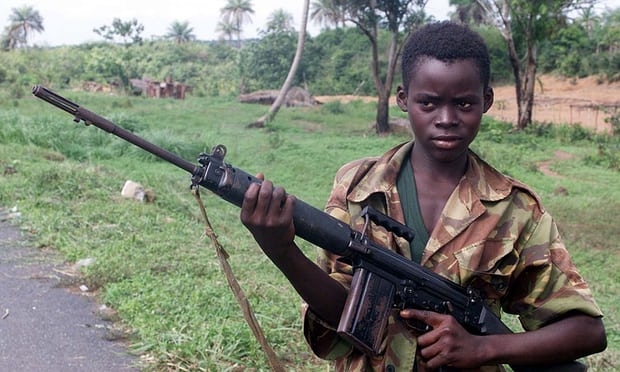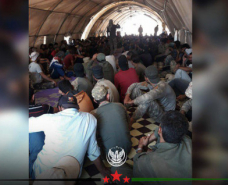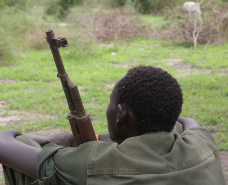UK firm 'employed former child soldiers' as mercenaries in Iraq

Alice Ross -
Former director acknowledges Aegis Defence Services may have recruited former child fighters in Sierra Leone
A former senior director at a British firm says that it employed mercenaries from Sierra Leone to work in Iraq because they were cheaper than Europeans and did not check if they were former child soldiers.
James Ellery, who was a director of Aegis Defence Services between 2005 and 2015, said that contractors had a “duty” to recruit from countries such as Sierra Leone, “where there’s high unemployment and a decent workforce”, in order to reduce costs for the US presence in Iraq.
“You probably would have a better force if you recruited entirely from the Midlands of England,” Ellery, a former brigadier in the British army, told the Guardian. “But it can’t be afforded. So you go from the Midlands of England to Nepalese etc etc, Asians, and then at some point you say I’m afraid all we can afford now is Africans.” He said the company had not asked recruits if they were former child soldiers.
Aegis Defence Services, which is chaired by Sir Nicholas Soames, a Tory MP and Winston Churchill’s grandson, had a series of contracts worth hundreds of millions of dollars to provide guards to protect US military bases in Iraq from 2004 onwards. From 2011 the company broadened its recruitment to take in African countries, having previously employed people from the UK, the US and Nepal.
Contract documents say that the soldiers from Sierra Leone were paid $16 (£11) a day. A documentary, The Child Soldier’s New Job, to be broadcast on Monday in Denmark alleges that the estimated 2,500 Sierra Leonean personnel who were recruited by Aegis and other private security companies to work in Iraq included former child soldiers.
“When war gets outsourced, then the companies tries to find the cheapest soldiers globally. Turns out that that is former child soldiers from Sierra Leone. I think it is important that we in the west are aware of the consequences of the privatisation of war,” the film’s maker, Mads Ellesøe, said.
Chi Onwurah, a Labour MP and chair of the all-party parliamentary group on Africa, said: “There’s an inherent racism in paying security guards less depending on the country they are coming from when they are facing the same risks as a guard from the UK.”
Aegis was founded in 2002 by Tim Spicer, the former Scots Guards officer who was at the centre of the 1998 “arms to Africa” scandal, in which his previous company Sandline was found to be breaching sanctions by importing 100 tonnes of weapons to Sierra Leone in support of the government.
Ellery, Aegis’ director of operations at the time of the Iraq contracts, previously served as chief of staff to the UN’s mission in Sierra Leone, at the time when the organisation was responsible for demobilising thousands of former child soldiers.
Interviewees in the documentary provided detailed testimony of serving as child soldiers, and documents showing their employment with Aegis.
One interviewee, Gibrilla Kuyateh, told the film’s makers: “Every time I hold a weapon, it keeps reminding me of about the past. It brings back many memories.” In extended footage seen by the Guardian he said he was kidnapped at the age of 13 by rebels who also killed his mother.
He described how the rebels forced him to amputate people’s limbs, “not always with a sharp instrument”, and trained him to fire an AK-47 that he said he struggled to carry because he was so small.
When Sierra Leone’s civil war ended in 2002, the international community spent millions of dollars giving former militia members the skills to use in peacetime. A UN mission demobilised more than 75,000 fighters, including nearly 7,000 children, at an estimated cost of $36.5m. The total number of children demobilised is understood to be far higher.
Sierra Leone remains one of the world’s poorest countries, and the documentary charts how from 2009 onwards private military firms turned to it, along with Uganda and Kenya, for cheap labour to guard military installations in Iraq.
Ellery, who said he was speaking in a personal capacity, told the Guardian that it would be “quite wrong” to ask whether people had ever been child soldiers, as it would penalise people for things they had often been forced into doing.
He pointed out that under UN rules, child soldiers are not liable for war crimes. “They are, once they reach 18, in fact citizens with full rights to seek employment, which is a basic human right. So we would have been completely in error if, having gone to Sierra Leone, we excluded those people.”
He added that Aegis was strict on physical health requirements. “The moment they [recruitment agents] start sending us people who are blind in one eye or have Aids, that’s it. Contract over.
“Because those sort of things, although they sound facetious, are big problems in Africa, because you don’t want people dying after you’ve put them through expensive training and then they die because they’ve got Aids and so on,” he said.
Aegis was taken over last year by GardaWorld, a Canadian security company. Graham Binns, Aegis’s former CEO and GardaWorld’s senior managing director, told the Guardian: “We worked very closely with our audited, vetted and authorised agents to recruit, vet and screen our professionals. Our agents were authorised [as was the employment of individuals] by the relevant national government of the countries from which we recruited.
“Aegis takes issues pertinent to our industry, such as post-traumatic stress very seriously, and has worked closely with experts in the field to develop and implement procedures for the management of trauma risk.”
Soames declined to comment.
Source: https://www.theguardian.com
###
Countering Military Recruitment

WRI's new booklet, Countering Military Recruitment: Learning the lessons of counter-recruitment campaigns internationally, is out now. The booklet includes examples of campaigning against youth militarisation across different countries with the contribution of grassroot activists.
You can order a paperback version here.








